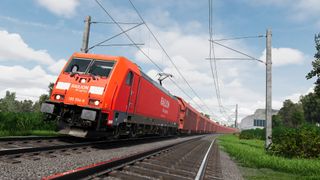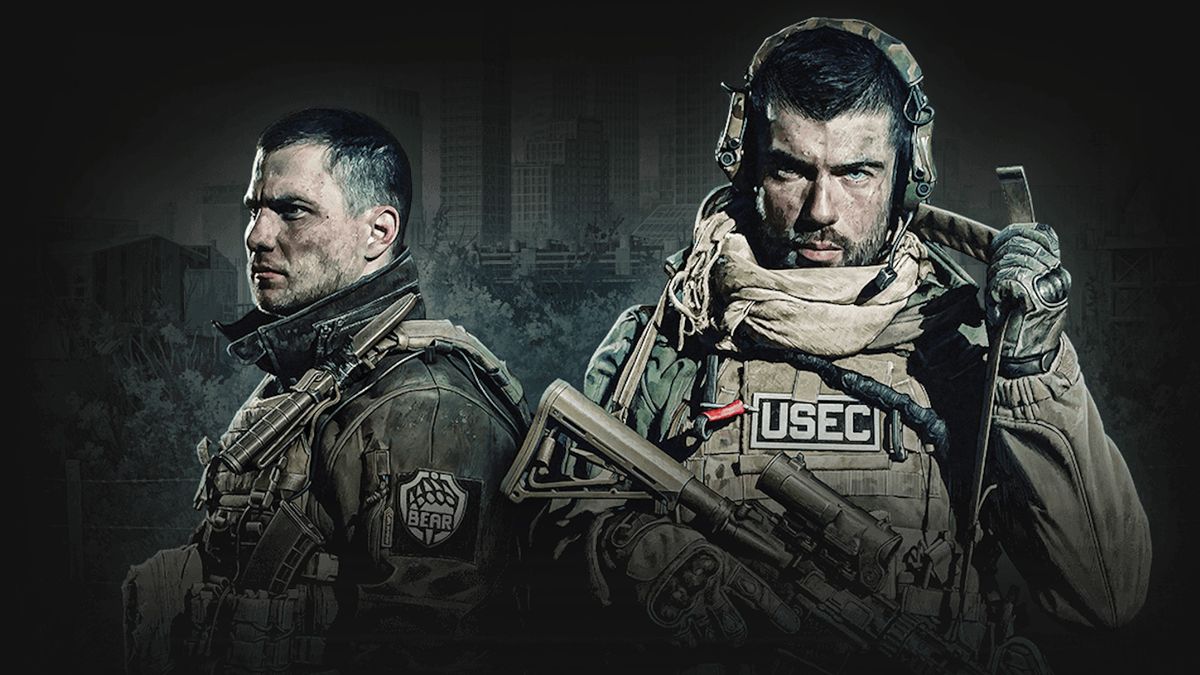Features
This article first appeared in PC Gamer magazine issue 392 in January 2024. Every month we run exclusive features exploring the world of PC gaming—from behind-the-scenes previews, to incredible community stories, to fascinating interviews, and more.
Have you ever sat down and actually considered how a train moves itself forward? Matt Peddlesden has. As executive producer on Dovetail’s Train Sim World 4, he’s thought about it more than most people. As he tells me about the inner workings of locomotives at Dovetail’s HQ in Kent, one thing becomes clear: if this wasn’t his job, he’d still be satisfying his passion and curiosity for trains.
That’s not a constant across the game industry. Not everyone you talk to is truly passionate about loot rarity, or brutal melee takedown animations, or seasonal skins. But over here in the world of simulators, they march to the beat of a slightly different drum. There’s an inherent passion here. You get the sense that many developers in this space are working simply because they want to see a certain thing made and then play it, and there’s a high amount of crossover between content creators and developers as a result.
It’s still gaming, more or less, but the rules are different. There’s an ultimate realism to strive for, and performing even mundane actions in a recognisably authentic way gives the sim fan their thrills. It’s why there’s a button for the windscreen wipers in Assetto Corsa Competizione. It’s why you spend 20 minutes going through checklists before getting airborne in Flight Simulator 2020. And it’s why Peddlesden’s team has thought long and hard about the exact distribution of braking pressure between carriages in Train Sim World 4’s roster.
This is the seventh release of the series, not to be confused with Dovetail’s Train Simulator releases, and features three routes across LA county, Austria and England’s own East Coast Main Line. For the community, it’s a new base into which they can plug DLC from previous releases and build their personal library of routes and vehicles. For Peddlesden, it’s the expression of a lifelong fascination.
“I’ve been interested in trains all my life,” he tells me. “My dad was a train and bus enthusiast. We used to go out trainspotting every weekend. There’s photographs of me when I was small, sitting on the ground [at the train station], playing with a toy train while they’ve got the proper ones behind me.” It’s been about trains for as far back as Peddlesden can remember.

That interest escalated when train simulators started entering the game industry. For people like Peddlesden, the advent of Microsoft Train Simulator in June 2001 was the first chance to take the step beyond the model train sets and into something more interactive. It was also the first step towards making games. “One of the things I started doing was content creation,” says Peddlesden. “I started teaching myself how to do my own repaints of things and sharing them.”
From there, he began to collaborate. “I started working with other commercial groups and got some of my work published in add-ons. And I helped other third party add-on developers with the bits they were missing. In one case there was an add-on called LTV or Erie Mining Company and they were missing a cab. So I built the cab for them.”
That led to Peddlesden running a website called UK Train Sim, which ran for over 20 years and hosted a quarter of a million members at its peak. With access to a whole community of like-minded creators, he began co-ordinating the development of bigger add-on pack projects with multiple collaborators and disciplines involved. The train enthusiast has inadvertently become a game developer.
Simulator development

And that’s not an uncommon story in the realms of simulator development. There have been tales of modders making the jump into development for as long as there have been modders and game developers, but in sim development it stands especially to reason: there’s nobody in the world more passionate about getting a carriage livery exactly right as the person who’s made it in their own time.
“I’ve always wanted to have this blend,” says Dovetail CEO Jon Rissik. “Amazing people who are passionate about trains and train simulation, supplemented with young people out of university and videogames professionals.”
Having a passion for the subject matter is a common route into the studio, Rissik explains. In the ‘old days’ that meant the team would go home and play the game they’d just been developing all day. There was no line of delineation between work and leisure. Times have changed since then. Processes refined, work-life balances attained. Nevertheless, Peddlesden took part in a 28-hour charity stream “off his own back” days before our conversation.
It’s not just the blurry line between player and developer that marks simulators like Train Sim World 4 out as separate to the mainstream industry. It’s the business model too. Assetto Corsa Competizione, the people’s racing sim, launched in 2019 and has released a steady stream of car and track packs since then. Flight Simulator 2020 has not only released numerous first-party DLC packs but also hosts a third-party marketplace stuffed to the gills with extras. And both of Dovetail’s train sims have attracted attention for the volume of DLC available in them.

At the time of writing, Train Sim World has released 88 individual pieces of DLC content since release in September 2023. Prior to that, Train Simulator 2020 made the headlines for listing over $10,000 in DLC on its Steam store page. It’s clear that sim developers view their products as platforms, as much as games themselves.
“The thought that I’ve always had,” says Rissik, “is that if you go to Tesco, they don’t expect you to buy everything in [there]. No retailer would expect you to buy everything in their store. We don’t expect you to buy everything that we make. What we want to do is offer you a range of stuff. And then you dip in and out as you want to because in this enthusiast market, it’s a bit like music tastes, there’s genres within genres. People want to collect different things.”
Some people love rock but hate reggae. Some people love 1970s British diesel locomotives but hate high-speed electric trains. The purpose of Dovetail’s voluminous DLC, Rissik says, is to give people options.
Perhaps not by coincidence, it’s a business model that bears some resemblance to EA’s famously profitable market position. In the olden days it was about bringing an unending stream of Sims expansion packs to shop shelves. Then it evolved to Ultimate Team microtransactions. It’s ironic, really, that the sims have drawn so much inspiration from The Sims.
“I think it’s fair to say that products like The Sims, and the attach rate [of the expansion packs] was part of the philosophy."
Jon RissikDovetail was itself founded by an EA veteran, Paul Jackson, in 2008. Jackson had published Rail Simulator, released in 2007, motivated in no small part by his own personal passion for trains. The sim itself didn’t take off, but when the company who owned the technology behind it came knocking some years later, Jackson spotted a business opportunity.
The newly formed Dovetail identified that while it had been very difficult for Rail Simulator to turn a profit selling physical copies and competing for attention on shop shelves next to Call of Duty and Need for Speed, increasingly popular digital distribution paths like Steam offered a way to hit the enthusiast markets. Classic long tail economics: you no longer had to front the cost for 50,000 boxed games. It was financially viable to sell 5,000 copies digitally, because there was no mechanical cost incurred in the manufacture of each copy.
“Steam was very welcoming to us,” says Rissik. “They liked the fact that we were bringing a [type of] player to the platform that was new for them. We were bringing new people into Steam, and they gave us incredible coverage, very supportive. They liked what we were doing and that really formed the foundation of the company back then.”
Rissik’s CV goes back to EA too, and both he and Jackson were taking notes about the successes the company had made during the early 2000s. “I think it’s fair to say that products like The Sims, and the attach rate [of the expansion packs] was part of the philosophy. I worked on The Sims with Paul. I worked directly with the studios, so I had a really good understanding of how it worked, whether it’s the development studio serving up new packages, or allowing the content creators to make their own content.”
Communities

That second point is key. Because as much as simulators might attract ire for the long lists of DLC they sell, they also host communities that generate a vast amount of content that you can download and plug into your game for free. And even beyond that, there are the third-party expansion sellers, cottage industries which spring up around major releases like Train Sim World 4.
It shouldn’t work on paper really. Why would anybody pay money for additional content when there’s more of it available for free than behind a paywall? And yet it does work. It worked for The Sims, which spawned early classic modding sites like TheSimsResource, 7 Deadly Sims and The Well Dressed Sim, but which also charged £20 for boxed expansions that added new content. And it appears that a similar equilibrium is achieved in Train Sim World.
“That’s how the sim space has always worked,” says Rissik. “Since Microsoft Flight Sim, Microsoft Train Sim. I guess you might call it open source. It’s freely available to anyone to use.” Dovetail works directly with content creators via a third-party team which works out the legalities and the logistics of bigger projects, then allow those creators to sell on Dovetail’s storefront “and take a 100% profit”.

Working with amateur creators globally has opened doors to new opportunities for the Train Sim World series. It’s shone a light into geographic blind spots and allowed the community to pour its passion into the gaps left by the base games. And it brought people like Matt Peddlesden into the fold.
Sitting next to the exec producer as he methodically and deftly moves an enormous multi-carriage train out of a small Austrian station, I wonder if, like sim racing, the appeal is simply demonstrating competence and skill in an authentic setting. In other words, do train simulator drivers care as much about arriving into the station on time as sim racers care about leaderboard times?
“It’s a procedural thing,” says Peddlesden. “It’s about getting every destination blind correct, getting the right headlights, because you’ve got different types of headlights on the trains. Using the American trains, it’s about using the right horns at the right time… there’s all these procedures that train enthusiasts like to learn.”
Sim enthusiasts, then, are to PC gamers what goalkeepers are to footballers. We’re all playing the same sport, but we’re looking at it from two different perspectives, fascinated by different aspects and performing diverging tasks. The software is more of a platform than a game, and the enjoyment is intrinsic to the authenticity of it. But in the end, we’re all just using our big RGB boxes to escape to virtual destinations where our job’s way more fun.

 3 months ago
82
3 months ago
82








